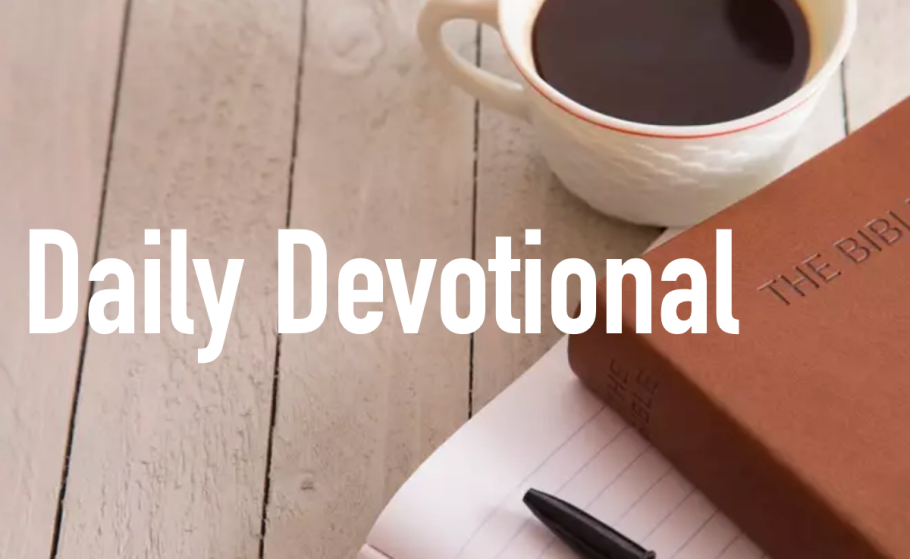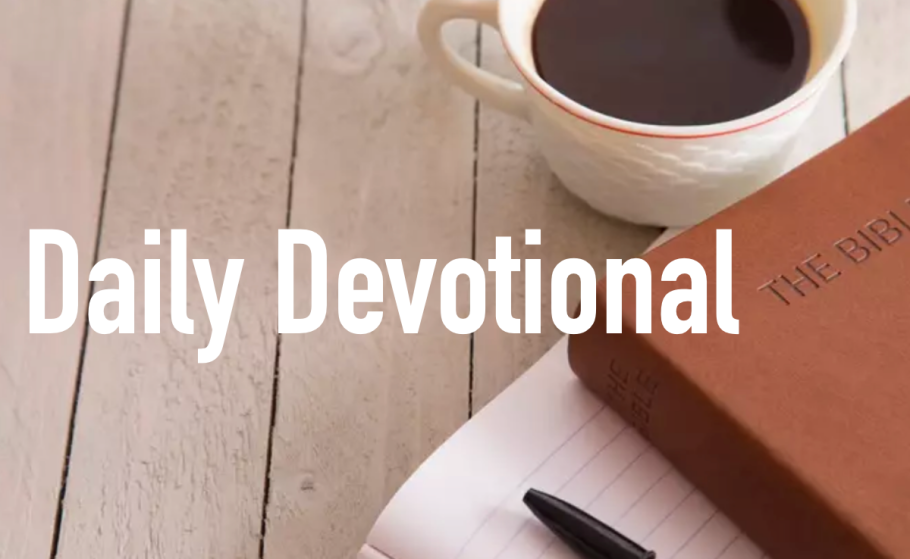
A rich French horn call opens one of my favorite classical music pieces, Piano Concerto No. 2 by Johannes Brahms. As the horn call rises, the piano’s notes meet it in the air, and we are drawn into the beautiful first movement.
That’s how a good call to worship works as well: we are drawn in by poetic words to praise the Lord. Psalm 33 is a call to worship, which is also a call to fear the Lord. Do we think of these two actions as joined? Today’s verse calls all the earth to “fear” Him, which in the second and parallel line becomes “revere” Him (v. 8). To fear the Lord means to wor- ship Him in awe and reverence.
What does fear of the Lord look like? You might be surprised. It looks like joy, singing, and praise (vv. 1–3). God is worthy of worship because He is righteous, just, faithful, and loving (vv. 4–5), as well as creative, powerful, and sovereign in authority (vv. 6–7, 9).
Ordinary human fear makes us want to run away, like the victim in a horror movie. The fear of the Lord, by contrast, makes us want to draw nearer to Him. He is awe-inspiring and infinitely greater than us, but at the same time He faithfully loves us. One source therefore defines “fear” in verse 8 as “to demonstrate respect for the Lord’s power and authority by worshiping him and obeying his commandments” (see Prov. 14:2).
This month, we will study what it means to fear the Lord. We will learn the implications for our spiritual lives. And we’ll look at biblical examples that show what it means to fear (or not fear) the Lord. As we grow in our fear of the Lord it will deepen our relationship with Him.
Go Deeper
What does it mean to fear the Lord? How and why can godly fear exist alongside love, joy, and hope (see also Ps. 33:18)?
Pray with Us: Dear God, as we begin this study, we pray that You will deepen our understanding of the true, godly fear and reverence. We want to know You and worship You in Spirit and in truth.

In today’s world, some say that Christians and non-Christians are in a “culture war.” How should we live in a society that views us with suspicion and hostility? Hebrews 12:14 outlines a strategy. Christians must live carefully, making “every effort to live in peace with everyone and to be holy.” The secret to such a lifestyle is the grace of God. The author of Hebrews sees living Christianly as both evidence and an outgrowth of God’s grace in the believer’s life (vv. 15–17).
Verses 18–24 continue to make the case for the preeminence of Christ by contrasting the experience of those who first received the Law with those who come to God by faith in Christ. In verses 18–19, the author reiterates and expands a contrast drawn in Hebrews 2:2–4 to highlight the difference. Sinai, where the Law was given, was a place of fire, darkness, gloom, and storm. Even more terrifying than the sight of fire and sounds of trumpet and thunder were the words that God spoke. The people “could not bear what was commanded” (v. 20). The sight was so terrifying that even Moses said, “I am trembling with fear” (v. 21).
Mount Zion is another name for Jerusalem in the Old Testament. It was the place where God showed His presence and Israel worshiped. But verses 22–24 describe it as a spiritual location and a new relationship. It is “the city of the living God,” “the heavenly Jerusalem,” and “the church of the firstborn, whose names are written in heaven.” Those who come to Mount Zion through faith, also come to God, “to the spirits of the righteous made perfect,” and “to Jesus.” He is “the mediator of a new covenant” that “speaks a better word than the blood of Abel.”
Go Deeper
As Christians, how do we live among non-Christians who judge us or view us with suspicion or scorn? What advice do we find in today’s reading?
Pray with Us: Lord, show us how to speak Your Word, “a better word than the blood of Abel,” to non-Christians in our lives. Take away fear and help us to speak about You boldly, even in the face of opposition.

After going through hardship, one woman widely known for her spirituality complained to God. “If this is the way you treat your friends, no wonder you have so few of them,” she grumbled. It can be hard to understand why God allows us to go through difficulties.
However, the examples of the men and women described in Hebrews 11, “of whom the world was not worthy,” proves that strong faith does not make us immune to hardship (see Heb. 11:38). But the ultimate proof that those God loves may still suffer is found in Jesus Christ. “Consider him who endured such opposition from sinners, so that you will not grow weary and lose heart” (v. 3). Verse 4 provides a reality check for the Hebrew Christians who first received this letter. They had suffered the confiscation of their property (Heb. 10:34). Still, none of them had lost their lives.
But the author of this book has a more encouraging message than simply saying, “Things could be worse.” God has a plan in our suffering. Verse 7 urges us to “endure hardship” because “God is treating you as his children.” We may think that this suffering is a penalty. But it is not punitive; rather, a matter of parental training. We have experienced discipline from our human fathers and managed to respect them (v. 9). How much more should this be the case when the One disciplining us is our perfect heavenly Father!
Any athlete will tell you that training by its very nature is uncomfortable and even exhausting. Why do we submit to it? Because we know what it will produce results. Faith does not eliminate hardship from our lives. It may even lead to it. But through it all, know that you can trust the guiding hand of your Father.
Go Deeper
What hardship are you (or someone you know) struggling with right now? How does Hebrews 12 change our perspective on suffering?

One of the lyrics in the first stanza of the hymn “How Firm a Foundation” asks, “What more can He say than to you He hath said, who unto the Savior for refuge have fled?” It is a question drawn from verse 32 of today’s reading. There are so many biblical examples of those who were victorious through faith that the author does not have the time or the space to mention them all.
The names listed in verse 32 would have been familiar to the original recipients of this letter. Gideon, Barak, Samson, and Jephthah won victories against overwhelming odds. In addition to being used by God to deliver His people during periods of oppression, they all share another trait in common. By themselves, they all would have been unlikely candidates for Faith’s Hall of Fame. Gideon and Barak were reluctant heroes who asked for reassurance (Judg. 4:8–9; 6:12–15). The Holy Spirit gave Samson great physical strength, but he was a person of weak personal character and impatient disposition (Judg. 14:1–3; 15:1–7).
Jephthah was the son of a prostitute and an impulsive person (Judg. 11:1, 30–35). David was over- looked by his father when Samuel came to anoint Saul’s successor (1 Sam. 16:11). Samuel was just a boy who needed to learn to recognize God’s voice when God called him (1 Sam. 3:1–7). If these examples were not enough, the writer mentions a host of unnamed heroes who went through great suffering despite their faith (vv. 35–37). Why? Because “the world was not worthy of them” (v. 38). Although God helped them to exercise a powerful faith, none received the promise because they were part of a bigger story. Their story is also our story (v. 40).
Go Deeper
Take some time to look up one or two of the people mentioned in this chapter and read their full biblical account. How does their faith story inspire your own? What can you learn from these examples?

Persistence of vision is the effect you see when you wave a sparkler in the air. The light appears to remain in place after the sparkler has moved. This effect is also what makes animation possible.
The Old Testament heroes of faith mentioned in today’s passage experienced a kind of persistence of vision. Faith enabled them to hold God’s promises in view after they had been given. Through their persistence in faith, they looked beyond the present and anticipated what God would do in the future.
Even though Abraham had “embraced the promises” that God would raise up descendants through Isaac, he placed Isaac on the altar when tested (vv. 17–18). God provided a lamb to take Isaac’s place, foreshadowing the sacrifice of Jesus Christ (Gen. 22:8, 13). Abraham was certain that God would fulfill His promise, even if it meant raising Isaac from the dead (v. 19). Isaac pronounced a blessing over his sons Jacob and Esau and predicted their future (v. 20; Gen. 27:27–29, 39–40). Jacob similarly blessed Joseph’s sons and spoke of their future as he was about to die (v. 22; Gen. 48:1–22).
Moses’ parents refused to obey Pharaoh’s edict to kill their firstborn son because “they saw he was no ordinary child” (v. 23). Moses, in turn, had a sense of this calling (Acts 7:25). Verse 26 observes, “He regarded disgrace for the sake of Christ as of greater value than the treasures of Egypt, because he was looking ahead to his reward.” The Israelites passed through the Red Sea on dry land and watched Jericho’s walls fall (vv. 29–30). The prostitute Rahab of Jericho welcomed the spies and saw her family saved (v. 31). Faith enables us to persist in obedience and helps us see “him who is invisible” (v. 27).
Go Deeper
Have you ever looked beyond the present and anticipated what God would do in the future? In what way would “persistence of vision” change your life?

